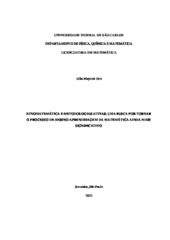| dc.contributor.author | Uno, Júlia Mayumi | |
| dc.date.accessioned | 2022-12-15T00:02:50Z | |
| dc.date.available | 2022-12-15T00:02:50Z | |
| dc.date.issued | 2022-11-10 | |
| dc.identifier.citation | UNO, Júlia Mayumi. Etnomatemática e metodologias ativas: uma busca por tornar o processo de ensino-aprendizagem da matemática ainda mais significativo.. 2022. Trabalho de Conclusão de Curso (Graduação em Matemática) – Universidade Federal de São Carlos, Sorocaba, 2022. Disponível em: https://repositorio.ufscar.br/handle/ufscar/17161. | * |
| dc.identifier.uri | https://repositorio.ufscar.br/handle/ufscar/17161 | |
| dc.description.abstract | Educational trends must adapt to the demands of society. In a world that increasingly requires creativity and problem-solving skills, it is necessary to train active and critical citizens. For this, one of the possible alternatives is to use Active Methodologies in the elaboration of lesson plans, in order to place the student as the protagonist of the teaching-learning process. This Course Conclusion Paper (CCP) investigates the concepts of Active Methodologies, Ethnomathematics and Interdisciplinarity, as well as the difference between "Exercise" and "Problem" in the mathematical context. Examples of active methodologies and suggestions for strategies to apply them in the classroom will be presented. The central objective of this CCP aims to bring greater meaning to the study of the concepts of regular polygons and their relationship with other areas of knowledge, in particular with Biological Sciences. To this end, it presents a mathematics lesson plan, focused on the Final Years of Elementary School, based on Ethnomathematics and one of the strategies of active methodology, Project-Based Learning or Problems. Among the results obtained, it is noteworthy that Active Methodologies, in addition to bringing results similar to those of a traditional class, also allow the development of self-confidence, self-esteem and student autonomy. More than that, the results showed that, by stimulating students' critical thinking in relation to the world they live in, the educator shows students that everyone has a role in society and that, with knowledge, a prepared and strong teaching team, the school community can mobilize large masses and make a difference. | eng |
| dc.description.sponsorship | Não recebi financiamento | por |
| dc.language.iso | por | por |
| dc.publisher | Universidade Federal de São Carlos | por |
| dc.rights | Attribution-NonCommercial-NoDerivs 3.0 Brazil | * |
| dc.rights.uri | http://creativecommons.org/licenses/by-nc-nd/3.0/br/ | * |
| dc.subject | Etnomatemática | por |
| dc.subject | Metodologias Ativas | por |
| dc.subject | Interdisciplinaridade | por |
| dc.subject | Plano de aula | por |
| dc.subject | Ethnomathematics | eng |
| dc.subject | Active methodologies | eng |
| dc.subject | Interdisciplinarity | eng |
| dc.subject | Lesson plan | eng |
| dc.title | Etnomatemática e metodologias ativas: uma busca por tornar o processo de ensino-aprendizagem da matemática ainda mais significativo. | por |
| dc.title.alternative | Ethnomathematics and active methodologies: a quest to make the teaching-learning process of mathematics even more meaningful. | eng |
| dc.type | TCC | por |
| dc.contributor.advisor1 | Pompeu Junior, Geraldo | |
| dc.contributor.advisor1Lattes | http://lattes.cnpq.br/7146270419829114 | por |
| dc.description.resumo | As tendências educacionais devem se adaptar às exigências da sociedade. Em um mundo que exige cada vez mais criatividade e habilidade de resolução de problemas, é necessário formar cidadãos ativos e críticos. Para tanto, uma das possíveis alternativas é utilizar Metodologias Ativas na elaboração dos planos de aula, a fim de colocar o aluno como protagonista do processo de ensino-aprendizagem. Este Trabalho de Conclusão de Curso investiga os conceitos de Metodologias Ativas, Etnomatemática e Interdisciplinaridade, bem como a diferença entre “Exercício” e “Problema” no contexto matemático. Serão apresentados exemplos de metodologias ativas e sugestões de estratégias para aplicá-las de forma eficiente em sala de aula. O objetivo central deste TCC é de trazer um maior significado ao estudo dos conceitos de polígonos regulares e à relação deles com outras áreas do conhecimento, em particular com as Ciências Biológicas. Para tal, apresenta um plano de aula de Matemática, voltado para os Anos Finais do Ensino Fundamental, baseado na Etnomatemática e em uma das estratégias de metodologia ativa, a Aprendizagem Baseada em Projetos ou Problemas. Entre os resultados obtidos destaca-se que as metodologias ativas, além de trazerem resultados semelhantes aos de uma aula tradicional, também possibilitam o desenvolvimento da autoconfiança e autoestima e autonomia do estudante. Mais do que isso, os resultados mostraram que, ao estimular o pensamento crítico dos alunos em relação ao mundo em que vivem, o educador mostra aos estudantes que todos têm um papel na sociedade e que, com o conhecimento, uma equipe docente preparada e forte, a comunidade escolar pode mobilizar grandes massas e fazer a diferença. | por |
| dc.publisher.initials | UFSCar | por |
| dc.subject.cnpq | CIENCIAS HUMANAS::EDUCACAO::ENSINO-APRENDIZAGEM | por |
| dc.publisher.address | Câmpus Sorocaba | por |
| dc.publisher.course | Matemática - ML-So | por |

